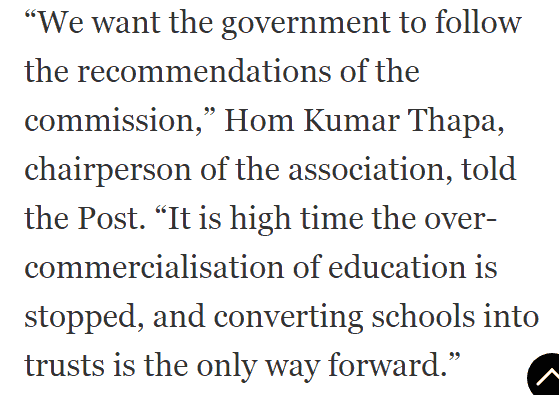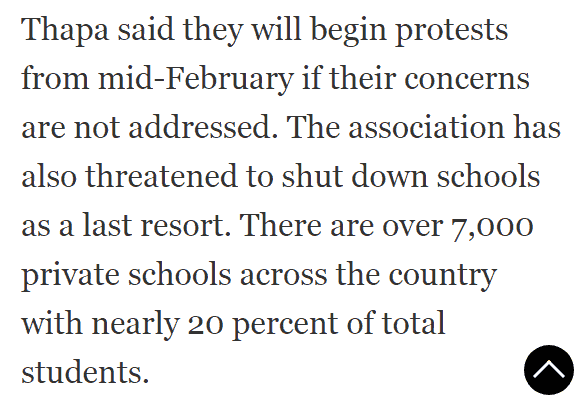Here’s what to me is one of the saddest — if not THE saddest — consequences of the very poor quality of education in the country: a private (institutional) school teachers’ association in the country is demanding that all private schools (currently registered as companies) be converted into trusts.
The recommendation for all private schools be converted into trusts in the next 10 years had actually originated just a few weeks ago from a High-level National Education Commission. (I can understand why the commission might have suggested that: the members of the commission are probably either highly incompetent and don’t know enough about education in the country or are keenly aware of the fact that the best way to control a population is by keeping the quality and level of their education very very low.)
But, according to The Kathmandu Post, the recommendation is NOT part of the education policy endorsed — last November — by the Cabinet. And yet, The Institutional School Teachers’ Association is demanding, as of just a few days ago, all private schools follow the Commission’s recommendation.
Here’s the relevant bit from the article.

Yes, the “over-commercialisation” of private schools is an issue around the country which is something most in the country are aware of.
I am one of those who have known about this from when private schools first started to mushroom, back in the nineties. As a matter of fact, I shared that observation in two episodes of the hour-long FM radio show I used to host in 1998. (Their contents have been reproduced here and here, if you are interested.)
BUT commercialization of private schools is NOT the BIGGEST problem and the MOST PRESSING issue with our education system, a system that has been around for almost 70 years and has the dubious distinction of being the most corrupt system in the country.
As far as I am concerned, the BIGGEST and the MOST PRESSING problem with our education system throughout has been the abysmally poor quality.
While not everything the private schools have introduced have added value to our education system, they have raised its quality. Granted, a majority of private schools still do NOT provide very good quality education. (One of the reasons behind that is the exam-driven system. The other reason is lack of PROPERLY qualified teachers.) What is true however is that, compared to public schools, a disproportionately higher percentage of private schools provide higher quality education. And this extreme measure the teachers are demanding, if implemented, will make the generally abysmally poor quality of education even poorer, of course!
I want to reiterate a conclusion I have shared in the past: our education system fails most students.
Going by the stance of the Association, it looks like those who have been failed include the current private school teachers. Being products of a system that imparts only the most basic of cognitive skills (recall) and minimal of critical thinking skills, no wonder, in the battle the teachers appear to have decided to fight (turning privates schools into trusts), in the argument they have put forward justifying the fight (to end “over-commercialization of education”), and in the action they have threatened to take to ensure their fight is successful (shutting down private schools), they, disturbingly, have displayed a lack of knowledge and understanding of our education system, a lack of ability to critically analyze and evaluate the system, AND their, the teachers’, role in it.
I must however add that even as a student at St. Xavier’s I knew about the lack of good and qualified teachers in the country.
At St. Xavier’s in the late seventies and eighties, the teachers who were the most fun, interesting, and engaging, as far as I was concerned, were pretty much ALL North-American. They had us analyze our favorites songs, write and make radio plays, write book reports etc., for example. They held us spellbound to the amazing stories they shared with us. They told us jokes and used a lot of humor in the classroom. My chemistry teacher shot tennis-ball cannons across the school! They made us inquisitive, they made us wonder, they made us think, they made us create…they inspired us. They made me want to go to school. They made me excited to go to school.
In my dealings with teachers at teacher education workshops I have conducted over the last two years too, I have come across more Nepali teachers with limited understanding of basic science than not.
I even came across more science teachers who struggled to apply basic science concepts to real-life problems than not. One that repeated again and again was their “answer” to a simple question involving a demonstration that has been part of my workshop I call Some Light Magic. I place a coin at the bottom of a bowl and ask them why they can’t see it. The answer I have gotten the most often is “Light travels in a rectilinear path.” Of course, that’s just a true, a factual statement and is NOT the answer!
Of course, there are a number of reasons for Nepali teachers not being very good. One is the low respect for the job and therefore the profession not being a draw for most, definitely not for the high achievers. (As a matter of fact, I am pretty sure, one of the reason people in Nepal don’t listen to me is because I am JUST a teacher!) The other is the low pay. Still another is the poor quality of teacher training programs in the country.
Be that as it may, I have been left to conclude that those that make up the Association are unable to critically analyze and evaluate our education system.
The other issue is that the Association and therefore the members of the association appear to have questionable ethics.
They appear to be oblivious to the major role they play in the education system. I am assuming that they are truly convinced that their demand — if followed through by the private schools — will benefit the demographic they serve, i.e. the students. And yet, what is the bargaining chip they use? The students! That is, of course, absolutely WRONG (see image below)!

To reiterate, an Association of TEACHERS have threatened to start a protest program starting in mid-February by shutting down schools if the schools don’t agree to fulfill their demand, and thereby punish the students. Try to wrap your head around that! It’s clear to me that they haven’t thought through or they couldn’t think through (for lack of ability?) or they don’t care how their actions might disrupt the lives and the education of hundreds of thousands of STUDENTS! That, if I may, is yet another evidence of their inability to think critically.
Having said all that, I must concede that the stance of the Association MAY NOT BE one endorsed by a majority of its members.
If that is indeed the case, the stance may not be representative of the Association as a whole, and therefore not be a reflection of the ability of the teachers to assess the education system. Nepal after all, is the land of possibilities….anything is possible! Let me explain!
The stance may well be that of Chairman Thapa and a small coterie of (very likely) middle-aged men — yes MEN — with political connections and aspirations. In other words, they may well be the stance of a handful of old men who stand to gain personally and/or professionally from it. After all, there is NO dearth of such old men in this country.
As for DRAMATICALLY improving the education system of the country…I will restate something I have said before: scrap grade 8 and grade 10 examinations, and textbooks. We need dramatic actions for dramatic changes. Incremental change will only ensure more generations of students — including the teachers the system produces — are failed by the system and thereby also continue to ensure the status of the country as a failed State.
What do you think?
* * * * * * * *
References
The Kathmandu Post (Jan. 26, 2020). Teachers demand that private schools be converted into trusts.
The Kathmandu Post (Jan. 26, 2020). Schools have 10 years to convert into trust, private school operators object to the move.
Nepaleaks.com (Dec. 2019). शिक्षकलाई तर्साएर गुणस्तर आउँदैन (Threatening a teacher does not raise quality of education). यस वर्षको नमुना परीक्षणमा नेपालका करिब ३७ प्रतिशत विद्यालयका बालबालिकाको सिकाइ कमजोर रहेको, ३९ प्रतिशतको सामान्य रहेको, २३ प्रतिशतको मध्यम रहेको तथा उच्च सिकाइ १ प्रतिशतको मात्र रहेको निष्कर्ष उक्त केन्द्रको छ । [Added Feb. 26, 2020.]
NagarikNews (Sept. 31, 2019). ८५ प्रतिशत माध्यमिक विद्यालय अयोग्य. [Added Feb. 26, 2020.]
My Republica (Aug. 7, 2019). 72% in Class 5 have no basic math, 55% can’t write a Nepali sentence. [Added Feb. 26, 2020.]

